| |
|
|
|
Paul Hellstrom Foster
Sergeant
H BTRY, 3RD BN, 12TH MARINES, 3RD MARDIV, III MAF United States Marine Corps San Francisco, California April 17, 1939 to October 14, 1967 PAUL H FOSTER is on the Wall at Panel 27E, Line 108 See the full profile or name rubbing for Paul Foster |

 |
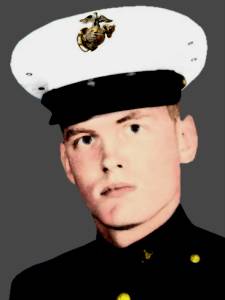
|
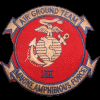
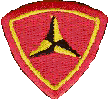
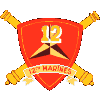
| |
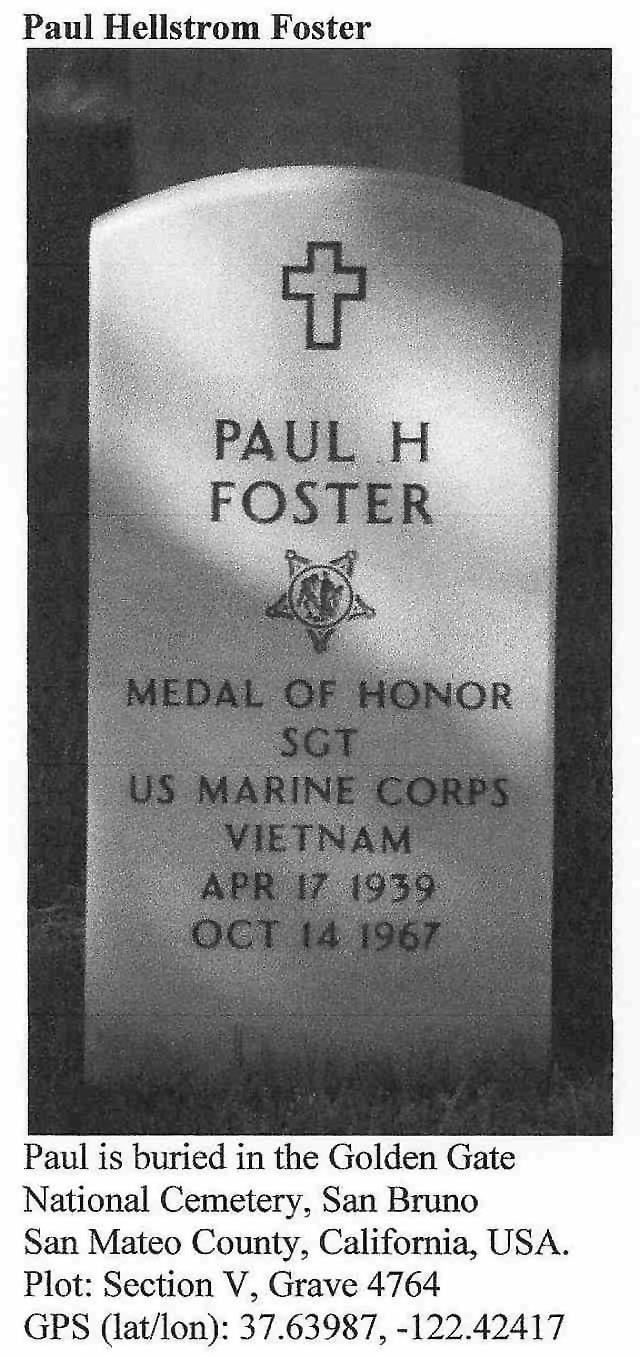
SGT PAUL HELLSTROM FOSTER
|
REMEMBERED ACROSS THE YEARS
Richard M. Nixon,
Sergeant Paul H. Foster
From a brother in combat, |
A Note from The Virtual WallIn the second week of October 1967 the 2nd Battalion, 4th Marines, relieved BLT 2/3 as the defense force for the recently built bridge north of Strongpoint C-2. The construction of the bridge had permitted the reopening of the vital road to Con Thien washed out by the heavy September rains. The battalion defended the bridge because the 3rd Marine Division was concerned that if the enemy destroyed the bridge they would cut the only supply line to Con Thien.The defense of the bridge was no easy task for Lieutenant Colonel Hammond's battalion. Since its move north from Camp Evans on 11 September, constant combat around Con Thien had worn the battalion down from a "foxhole strength" of 952 to about 462. The 2nd Battalion, 4th Marines had great difficulty in manning all the defensive positions prepared by the departed full-strength BLT-2/3. The defensive position around the bridge was divided into quadrants by virtue of the road, which ran roughly north and south, and the stream, which ran east and west. Golf Company had the northwest quadrant; Hotel Company was on the same side of the road but across the stream in the southwest quadrant. Fox Company was in the northeast; Echo Company in the southeast. The battalion command group set up beside the stream in Golf Company's area and near the center of the position. At 0125 on 14 October, 25 artillery rounds, rockets, and 135-150 mortar rounds hit Hotel Company. An ambush squad posted in front of the company reported an enemy force moving toward it, and immediately took the advancing enemy under fire. The Marine squad leader notified his company that he had three casualties and that the enemy seriously outnumbered his squad. The company commander, Captain Arthur P. Brill, Jr., ordered the squad to pull back and, at the same time, called for night defensive fires to block the avenues of approach to his position. The battalion requested flare ships to illuminate the area. Using starlight scopes, sniper teams watched the enemy as they massed only 50 meters in front of the company. The snipers and two tanks attached to the company opened fire, forcing the North Vietnamese to start their assault prematurely. The rest of the Hotel Company held fire until the NVA troops reached a clearing 20 meters from the wire. Of the entire attacking unit, only two NVA soldiers reached the wire and Marines killed both as they tried to breach that obstacle. The enemy withdrew, leaving bodies behind, but they were far from finished. At 0230, enemy mortars shelled Golf Company. Direct hits by RPGs destroyed a machine gun emplacement and several backup positions on the primary avenue of approach into the company position. The NVA force attacked through this break, overran the company command post, and killed the company commander, Captain Jack W. Phillips, and his forward observer. Three platoon leaders, two of whom had just arrived in Vietnam that morning, also died. The battalion sent its S-3A, Captain James W. McCarter, Jr., to replace Phillips, but enemy fire killed him before he reached Golf Company. During the confused, hand-to-hand combat some of the North Vietnamese fought their way within grenade range of the battalion command post in the center of the position. In the command post, although wounded by a grenade, Sergeant Paul H. Foster, a member of the fire support coordination center, continued to direct mortar and artillery fire upon the enemy. Another grenade landed among a group of six Marines. Sergeant Foster threw his flak jacket over the grenade and jumped on top of the jacket. The grenade blast mortally wounded him, but this action saved his fellow Marines. Before the melee ended, the North Vietnamese killed or wounded the entire forward air control team. The enemy also killed the battalion medical chief, and wounded the fire support coordinator, headquarters commandant, and battalion sergeant major. Lieutenant Colonel Hammond moved what was left of his command group to a better location within Hotel Company's position. He ordered Fox Company to move to Golf Company's right flank and counterattack to push the NVA forces out of the perimeter. Illumination and automatic weapons fire from "Puff," the AC-47 requested at the beginning of the fight and which arrived about 0330, aided the counterattack. By 0430, the enemy began retreating out of the position, pursued by Echo Company. The next morning the 2nd Battalion reconsolidated and evacuated casualties. There were twenty-one dead (18 from 2/4 Marines) and two dozen or more wounded. The NVA lost at least 24 killed. That afternoon, Lieutenant General Cushman and Major General Hochmuth visited the bridge site. They granted a request from Lieutenant Colonel Hammond that the new bridge be named "Bastard's Bridge" to honor the 18 Marines of the 2nd Battalion who gave their lives in its defense. At 1400, Hammond's battalion turned over the bridge to Lieutenant Colonel Needham's 3rd Battalion, 3rd Marines and then moved to Dong Ha where it assumed the mission of regimental reserve after 42 days of close combat. The men killed in action at Bastard's Bridge were
OPERATION KINGFISHER Report\ |
| Contact Us | © Copyright 1997-2019 www.VirtualWall.org, Ltd ®(TM) | Last update 08/15/2019 |